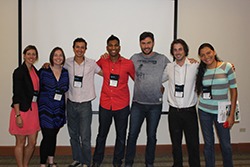Pesca-kucha: Fisheries Presentations in a Whole New Format at 2WSFC

Pesca-kucha. This has nothing to do with fusion cuisine where Italian food melts with a Japan dish. Pesca-kucha is a new way of presenting reports, data and research with Powerpoint. How does it work? It is quite straightforward: each researcher is allowed 20 slides to present his/her topic. However, there is a catch: a timer is set on the presentation and each slide will stay on for only 20 seconds. If you go past this time, the next slide is up. The presenter has exactly 6 minutes and 40 seconds to show his/her findings in a clear and entertaining way. Pesca-kucha was inspired by the Pecha Kucha Nights events. Pecha Kucha means “chit chat” in Japanese.
The Too Big To Ignore project (TBTI) organised the first pesca-kucha session as an alternative form of presentation about fisheries research. It took place in Merida (Mexico) during the 2WSFC. Seven participants (students and recent graduates) decided to challenge the clock! The room was full and, in 7 x 6 minutes and 40 seconds, the audience was introduced to themes from post-colonialism and fisheries in Alaska to estimation of finfish fisheries in Mexico; network building in Brazil to small-scale fisheries and MPA in Chile; food security, livelihood and resilience in Bolivia to community-based conservation in India and finally governability of small-scale fisheries in Colombia. And if technical issues appear with a Powerpoint presentation (and it did), solutions have to be found in a nick of time, as the show must go on (the clock does not wait)!
The challenge with this type of presentation is to narrow down the information to its essence and the hardest part is to fit it in a rigid canvas (20 slides/20 seconds). Participants found the exercise much harder than it appeared at first and the main questions in the design process were: is the information relevant, understandable, and will the presentation be engaging? But in the end, the format allows for a vivid representation of the research topic. The audience in Merida got immediately caught up in this fast paced session and warmly supported the presenters.
Entertaining, challenging, creative, energizing, these are a few words that could describe the pesca-kucha session that took place. And when the researchers were asked if they would participate again, all agreed they would without hesitation!
Written by: Olivier Randin, PhD Student, Department of Geography
Too Big Too Ignore (TBTI) is a research network knowledge mobilization partnership funded by Social Sciences and Humanities Research Council (SSHRC). For more information, please visit http://toobigtoignore.net/.